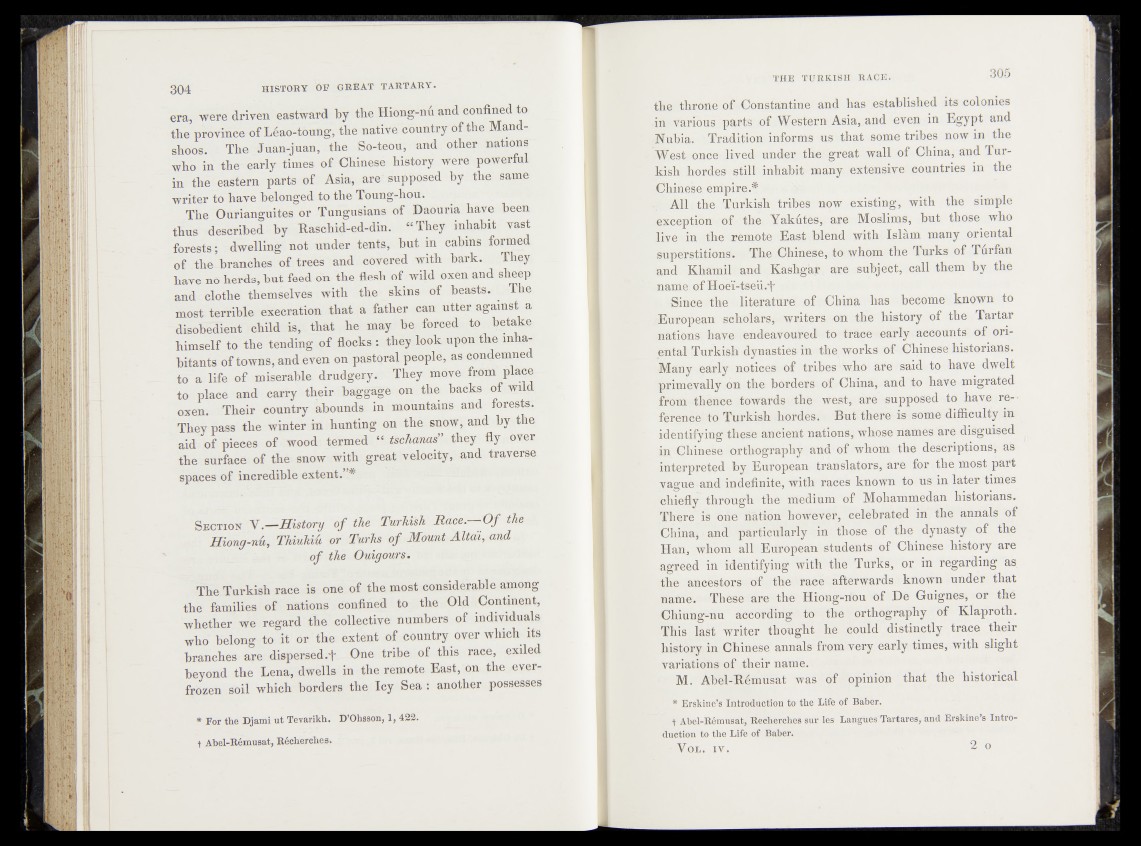
era, were driven eastward by the Hiong-nh and confined to
the province of L6 ao-toung, the native country of the Mand-
shoos. The Juan-juan, the So-teou, and other nations
who in the early times of Chinese history were powerful
in the eastern parts of Asia, are supposed by the same
writer to have belonged to the Toung-hou. ■
The Ourianguites or Tungusians of Daouria have been
thus described by Raschid-ed-din. “ They inhabit vast
forests; dwelling not under tents, but in cabins formed
of the’branches of trees and covered with bark. They
have no herds, but feed on the flesh of wild oxen and sheep
and clothe themselves with the skins of beasts. ^ The
most terrible execration that a father can utter against a
disobedient child is, that he may be forced to betake
himself to the tending of flocks : they look upon the inhabitants
of towns, and even on pastoral people, as condemned
to a life of miserable drudgery. They move from place
to place and carry their baggage on the backs of wild
oxen. Their country abounds in mountains m& forests.
They pass the winter in hunting on the snow, and by the
aid of pieces of wood termed “ tschanas” they fly over
the surface of the snow with great velocity, and traverse
spaces of incredible extent. *
S ec tio n V.—History of the Turkish Race.—Of the
Hiang-nü, Thiuhiu or Turks of M o u n t Altai, and
of the Ouigours.
The Turkish race is one of the most considerable among
the families of nations confined to the Old -Continent,
whether we regard the collective numbers of individuals
who belong to it or the extent of country over which its
branches are dispersed .f One tribe of this race, exiled
beyond the Lena, dwells in the remote East, on the ever-
frozen soil which borders the Icy Sea : another possesses
* For the Djami ut Tevarikh. D’Ohsson, 1, 422.
t Abel-Rémusat, Récherches.
the throüe of Constantine and has established its colonies
in various parts of Western Asia,,and even in Egypt and
Nubia. Tradition informs us that some tribes now in the
West once- lived under the great wall of China, and Turkish
hordes-, still inhabit many extensive countries in the
Chinese empire.*
; All;the Turkish tribes now existing, with the simple
exception of the Yakótes, are Moslims, but those who
jUvê ,in the remote East blend with Isldm many oriental
superstitions; The Chinese, to whom the Turks of Turfan
and Khamil and Kashgar are subject, call them by the
name of Hoeï-tseii/f*
Since the f literature of China has ^become known to
European scholars, writers on the history of the Tartar
nations have endeavoured to traee early accounts of oriental
Turkish dynasties in the_ works of Chinese historians.
Many early notices--of tribes 'iwjao are said have dwelt
primevally on the; borders ofcChina, and to have migrated
from -thence towards the west*, are supposed to have reference*
to Turkish hordesfV* ButtheF©4 is .some difficulty, in
identifying these ancient nations, whose names arê disguised
in Chinese orthography and of whom* the descriptions, as
interpreted by European translators, are for the most part
vague and indefinite, with races known to us in later times
Ijbhiefly through the medium of Mohammedan historians.
There" is one nation however, 'Celebrated in the annals of
'Chinaj • and particularly dri those ,» ;the dynasty of the
Han, whom all European students of CSmëSe history are
agreed in identifying with'the Turks, otf^n regarding as
the ancestors of thm race afterwards known under that
name. These are the Hiong-ifou *0f De Guignes, or thé
Chiung-hu according to the orthography of Klaproth.
This last writer thought he could distinctly trace their
history in Chinese annals from very early times, with slight
Variations of their name. Ï
M. Abel-Rémusat was of opinion that the historical
* Erskine’s Introduction tofthe Life of Baber.
~ f Abel-Rémusat, Recherches sur les Langhes Tartares, and Erekine’s Introduction
to the Life of . Baber.
VOL. IV. I ■ 2 °